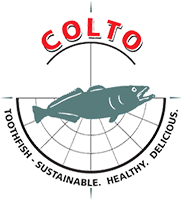Toothfish fishing occurs in a number of regions around the Antarctic continent, in the high seas waters of the Antarctic and sub-Antarctic regions, as well as in several Exclusive Economic Zones (EEZs) in the southern oceans. An EEZ is a declared region of water, out to 200 nautical miles from the coastline of a country, which that country is responsible for in terms of resource management and other activities.
COLTO members operate in many of these regions, including waters surrounding territories of Argentina, Australia, Chile, Falkland Islands, France, South Africa and Sough Georgia (UK). Unfortunately, in the past there were some unscrupulous operators who also chose to operate illegally in those regions, and COLTO members worked and continue to work together with governments, CCAMLR and NGOs to keep these illegal activities at bay.
COLTO is proud that our toothfish fisheries are well managed (7 of which are now MSC certified as sustainable and well managed), and that effective surveillance and enforcement exists to stop illegal, unregulated and unreported (IUU) fishing activity. Since 2005, there has been virtually zero IUU fishing in any of the EEZs fisheries, or the Ross Sea, and since 2015, IUU fishing on the high seas for toothfish has been virtually eliminated, but we do recognise that, left unmonitored, there remains potential for IUU activity to resume.
Governments, industry and NGOs have worked very hard to combat IUU fishing, and COLTO has contributed to the successful reduction in IUU fishing for toothfish, with a recent study concluding COLTO was the second most influential body (behind CCAMLR) in substantially reducing IUU fishing in the Southern Ocean. With our international industry linkages, we have a unique ability to provide assistance, support and surveillance information to Governments, CCAMLR, RFMOs and NGOs in the fight against IUU fishing.
In the past, COLTO has worked with NGOs to publicise and identify IUU operators, their companies, boats, individuals and trading names. This has helped the public be more aware of the need to buy legally caught toothfish products, and demonstrated the actions being taken by legal industry members to ensure the toothfish that they are eating is sourced from sustainable, well managed fisheries in the southern oceans.
In more recent times, COLTO has expanded its focus to help its members achieve best practice on the water, as well as to help facilitate partnerships with various scientific projects within our toothfish fisheries.
In total, COLTO members represent catches of around 80% of the total global production of toothfish, which is around 30,000 tonnes annually (green weight).
